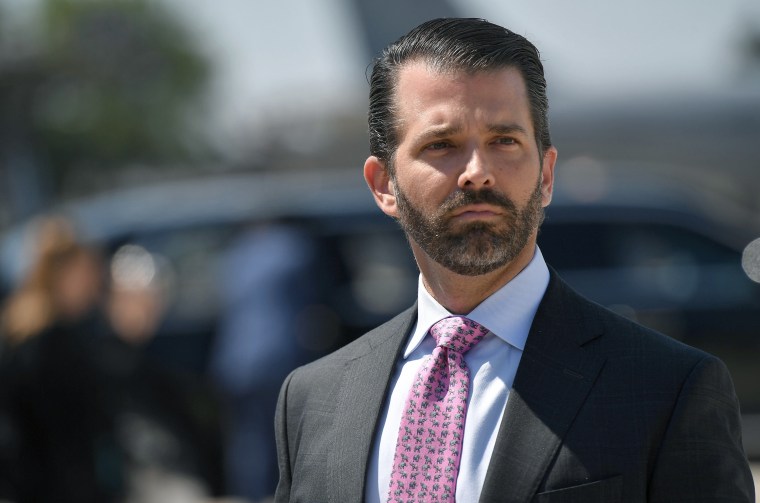WASHINGTON — Former special counsel Robert Mueller on Wednesday declined to say whether President Donald Trump’s oldest son, Donald Trump Jr., invoked the Fifth Amendment when asked to testify in the Russia investigation.
During the first of two public hearings with Mueller on Wednesday, Rep. Joe Neguse, D-Colo., asked Mueller whether Trump Jr. or his counsel ever communicated to the special counsel’s office any intent to invoke his Fifth Amendment right against self-incrimination.
“I’m not going to answer that,” said Mueller toward the end of a more than three-hour public hearing before the House Judiciary Committee.
Trump Jr. was not interviewed by investigators on Mueller’s team, and it's been unclear why he wasn’t forced to be questioned when he was a key witness in the Russia probe.
The president’s son was the only Trump associate to participate in the June 2016 Trump Tower meeting between the Trump campaign and Russian individuals who declined to be voluntarily interviewed by the special counsel's office, said Neguse.
“Yes,” Mueller said when asked if that was a correct statement.
In June 2017, the president directed Trump Jr. and his communications director at the time, Hope Hicks, to issue a misleading public statement about the nature of the 2016 Trump Tower meeting.
Neguse recounted that Mueller’s investigation found that Hicks was shown emails in June 2017 that set up the meeting. The congressman said that Hicks told Mueller’s office that she was shocked by the emails because she said they “looked really bad.” Mueller’s report also indicated that when the Russian official offered Trump campaign officials alleged documents incriminating Hillary Clinton, Trump Jr. responded, “If it’s what you say, I love it.”
Asked if Trump Jr., the president’s son-in-law Jared Kushner, and then-campaign chair Paul Manafort then met with a Russian attorney Natalia Veselnitskaya and other Russians at Trump Tower on June 9, 2016, Mueller said, “Generally accurate.”
Mueller also confirmed that Hicks told the special counsel’s office that she urged Trump multiple times to be transparent about the Trump Tower meeting, and he objected each time. He also confirmed that Trump directed Hicks to say only that Trump Jr. took a brief meeting about Russian adoption because the president’s son’s statement to The New York Times said too much.
Neither Trump Jr. nor Kushner were charged for their involvement in the meeting.
The 448-page Mueller report released in April said that there was not enough evidence to prove that the people involved in the Trump Tower meeting knew that accepting help from a foreign government or foreign nationals was illegal.
“On the facts here, the government would unlikely be able to prove beyond a reasonable doubt that the June 9 meeting participants had general knowledge that their conduct was unlawful," the report said. "The investigation has not developed evidence that the participants in the meeting were familiar with the foreign-contribution ban or the application of federal law to the relevant factual context. The government does not have strong evidence of surreptitious behavior or efforts at concealment at the time of the June 9 meeting."
During the second hearing of the day Wednesday, before the House Intelligence Committee, Rep. Terri Sewell, D-Ala. — who highlighted the fact that Mueller had not charged Trump Jr. or any other attendees at the Trump Tower meeting with conspiracy — asked if the former special counsel had any knowledge of anyone ever reporting the offer of so-called "dirt" on Hillary Clinton from Russia to the FBI.
"I don't believe so," said Mueller, who later added that political campaigns should report to that agency any information received from a foreign government: "I would think it's something they would and should do."

